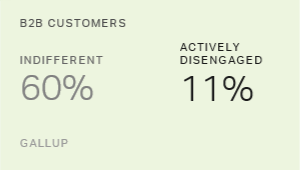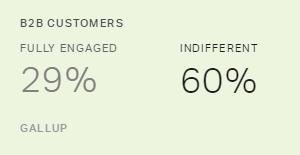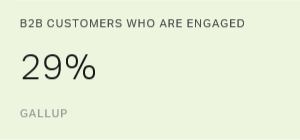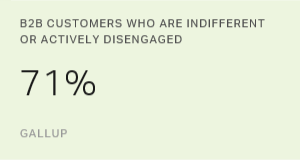Story Highlights
- Only 29% of B2B customers are engaged
- A key driver of organic growth: mastering the basics of engagement
- Evaluating relationships is another key driver
This article is the first in a two-part series.
If business-to-business (B2B) companies are failing to grow organically, the reasons are clear.
According to a Gallup report, 60% of B2B customers are indifferent and 11% are actively disengaged, while just 29% are fully engaged. Such low levels of engagement are not a recipe for organic growth -- that is, getting more business from existing accounts.
To combat this problem, B2B companies need to tailor their approach to creating customer impact in each of their most important accounts.
Gallup has identified four areas that companies and their account teams can focus on to engage customers and deliver impact. These key drivers of success include engagement, relationships, opportunities, and positioning and approach. This article discusses the first two areas; the next article will discuss the others.
The Basics of Engagement
When it comes to evaluating customer engagement, B2B companies should first ask this fundamental question: "Are our customers engaged with us as a vendor?"
Though companies might think they know where they stand with their key accounts, this information often remains hidden from leaders, particularly with some of their more problematic accounts.
This disconnect occurs when account teams don't ask customers the right questions, fail to notice any initial signs of distress or are slow to filter what they see and hear back up the chain of command.
Communication about delays and other quality issues can become convoluted when problems occur at the plant, factory or site. Account teams also tend to downplay problems that come to their attention. Teams react this way because they believe they have taken the necessary steps to address issues, or they think the relationship is strong enough to withstand the problems even if they were initially slow to respond.
Often, the simplest problems seem more severe to customers than they do to B2B companies because customers understand exactly how problems affect their budgets and timelines. And customers almost always remember problems that occur -- and how the account team responded -- which influences their future interactions with the company.
Therefore, B2B companies need to monitor their performance regularly with their key accounts. Gallup recommends that B2B companies have a structured problem resolution process and that all account teams consistently identify and record issues, as well as communicate them to leadership.
Relationships
When evaluating customer relationships, B2B companies need to ask themselves: "Are there strong connections between our company and our customers?"
Relationships between companies and customers occur at many organizational levels. Some companies and customers are more of a natural fit than others, based on size, geography or a shared sense of values.
Crucial day-to-day interactions with customers happen at the account level. Though it is important for customers to like a company's account representatives, customers also need to trust those representatives.
The best account representatives have an intimate knowledge of each customer and its business, people and problems. They work tirelessly and aggressively to get things done for their customers, such as getting orders processed and delivered, making last-minute changes to orders, and addressing or preventing problems.
The best representatives also are a source of business ideas for their customers. They serve as the gateway to a B2B company's additional resources.
But even the most talented account representatives can take the customer relationship only so far if they don't know or can't effectively speak to their company's broader offerings or strategy. It is vital, then, that executive-level relationships support and reinforce account-level relationships. These executive-level relationships facilitate strategic and forward-thinking business conversations and can help B2B companies correct any lingering problems with their customers.
The next article in this series will discuss the remaining two drivers of customer engagement: opportunities, and positioning and approach.




